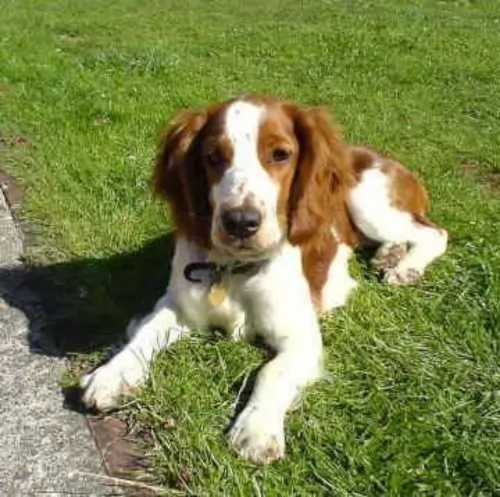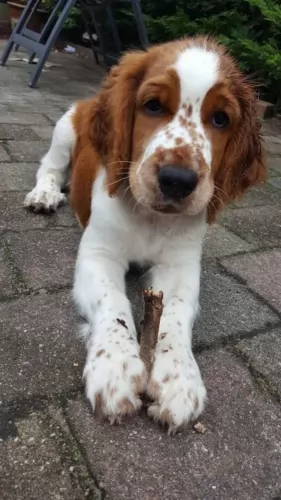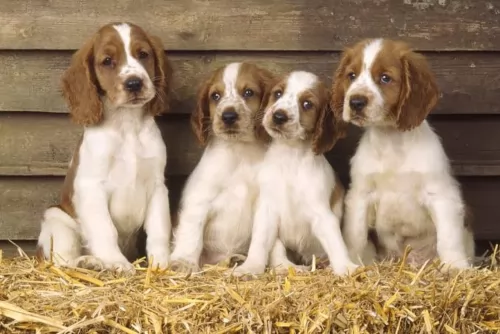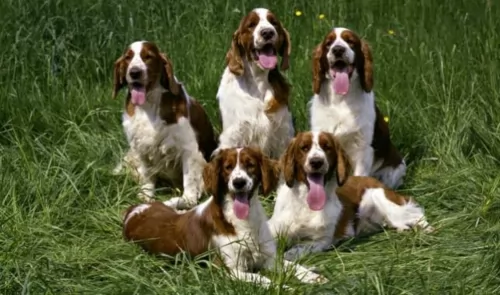 Petzlover
Petzlover Small Munsterlander is originated from Germany but Welsh Springer Spaniel is originated from United Kingdom. Small Munsterlander may grow 8 cm / 4 inches higher than Welsh Springer Spaniel. Small Munsterlander may weigh 6 kg / 14 pounds more than Welsh Springer Spaniel. Both Small Munsterlander and Welsh Springer Spaniel has same life span. Both Small Munsterlander and Welsh Springer Spaniel has same litter size. Small Munsterlander requires Low Maintenance. But Welsh Springer Spaniel requires Moderate Maintenance
Small Munsterlander is originated from Germany but Welsh Springer Spaniel is originated from United Kingdom. Small Munsterlander may grow 8 cm / 4 inches higher than Welsh Springer Spaniel. Small Munsterlander may weigh 6 kg / 14 pounds more than Welsh Springer Spaniel. Both Small Munsterlander and Welsh Springer Spaniel has same life span. Both Small Munsterlander and Welsh Springer Spaniel has same litter size. Small Munsterlander requires Low Maintenance. But Welsh Springer Spaniel requires Moderate Maintenance
 Known also as the Kleiner Munsterlander or just plain Munster, the Small Munsterlander comes from the Munster region of Germany and is a beautiful hunting dog.
Known also as the Kleiner Munsterlander or just plain Munster, the Small Munsterlander comes from the Munster region of Germany and is a beautiful hunting dog.
The dog is recognized by the Fédération Cynologique Internationale as well as other kennel clubs. It is believed that the Small Münsterländer is an ancient breed, more than 500 years old.
 The Welsh Springer Spaniel is thought to be an old Land Spaniel similar to the English Springer Spaniel. They were pretty mush an unknown breed until they won a string of dog trials and became more popular. Following this surge the breed was recognized by the UKC in 1902 and were named the Welsh Springer Spaniel. No one really knows when the breed was developed and cannot be traced because of lack of documentation. They were brought to America in the early 1900’s and were recognized as a breed by the AKC (American Kennel Club) in 1906.
The Welsh Springer Spaniel is thought to be an old Land Spaniel similar to the English Springer Spaniel. They were pretty mush an unknown breed until they won a string of dog trials and became more popular. Following this surge the breed was recognized by the UKC in 1902 and were named the Welsh Springer Spaniel. No one really knows when the breed was developed and cannot be traced because of lack of documentation. They were brought to America in the early 1900’s and were recognized as a breed by the AKC (American Kennel Club) in 1906.
There are images of a dog looking a lot like the Welsh Springer Spaniel in old prints and pictures. The pictures are of a dog known as a Land Spaniel very much like the Welsh Springer Spaniel. These dogs were thought to be preserved by the Welsh and originally called the Welsh Starter. It was a hunting breed working with falcons.
At one point the breed was called the Welsh Spaniel and was also in the UK studbook as a Cocker Spaniel or a Welsh Cocker. There were several different types of Cocker Spaniels including the English Cocker, the Welsh Cocker, the Devonshire Cocker. The Welsh Cocker Spaniel was a solid dark color while the Welsh and Devonshire Cockers were liver colored.
Following World War II there were no dogs left in Wales or anywhere else in the United Kingdom whose parents were registered pedigree. The unregistered dogs were used to restart the breed and these dogs are the ancestors of the modern Welsh Springer Spaniel.
The breed is still rare with only 299 registered in the UK in 2016. They are listed now a vulnerable Native Breed.
 Standing at between 52–56cm in height and weighing between 17–26 kg, this dog is thought to be medium sized, muscled and athletic.
Standing at between 52–56cm in height and weighing between 17–26 kg, this dog is thought to be medium sized, muscled and athletic.
Looking like a large Spaniel he also has feathering around the legs and the tail. The coat is medium length and silky and tends to be slightly wavy. The coat is essentially white with large brown patches as well as some ticking.
Small Münsterländers are very intelligent dogs and they won’t have any trouble being trained and socialized. The Small Munsterlander is a natural born hunter and he is in his element when he is outdoors.
For this particular dog, it would be a shame to get a pet like this if you’re a couch potato. It is why this dog is better suited to living in the countryside as opposed to the city. He needs lots of exciting outdoor activities - hikes, walks, ball games, running and he loves swimming.
He is a loving, social dog and just wants to be 100% part of his human family and will adapt well to life with children in the home and with other pets.
 The breed is a medium size, solid and compact dog bred to work. Their forequarters are angled and there hindquarters are well developed. This is a very good looking breed that is only red with white markings. A hard working dog bred to hunt. They are slighter longer than tall and are not penalized as long as the height tis not greater than the length.
The breed is a medium size, solid and compact dog bred to work. Their forequarters are angled and there hindquarters are well developed. This is a very good looking breed that is only red with white markings. A hard working dog bred to hunt. They are slighter longer than tall and are not penalized as long as the height tis not greater than the length.
The tail in docked except in countries where it is illegal to do so. Their eyes should be brown. Noses are black or brown. The ears are small with a fethering like most setters. The show and field styles are the same. They are confused with the Engolish Springer Spaniel even though there are many differences. But both breeds are born to hunt and “spring” at the prey. They are smaller than the English Springer Spaniel and larger than the English Cocker Spaniel.
 The Small Munsterlander is such a pretty looking dog with his silky hair. He isn’t only about good looks either and he is intelligent and alert and will learn easily.
The Small Munsterlander is such a pretty looking dog with his silky hair. He isn’t only about good looks either and he is intelligent and alert and will learn easily.
He is a well balanced dog and will make a great pet and companion. He is social, friendly, loving and loyal and makes a great playmate for children.
He has always been a hunting dog and likes to be busy with games and work. Go on a hike and he will love to join you, sniffing along woodland paths and chasing birds. He is in his element when outdoors.
When you bring this beautiful dog into your home, you’re guaranteed to have an ideal pet and companion for the entire family.
 There are many clubs and breeders who have a strong commitment to the health of the breed, and this is a healthy, robust dog breed.
There are many clubs and breeders who have a strong commitment to the health of the breed, and this is a healthy, robust dog breed.
The Small Munsterlander can succumb to one of the many common dog illnesses there are. These can be ear infections, dental problems, cancer, diabetes, hip dysplasia, obesity, bloat and many others.
There are so many things that can cause skin problems with your dog, and while it doesn’t sound particularly serious, it can drive your pet crazy as he tries to bite and scratch the itchy parts on his skin.
These nightmarish skin problems are one of the most common reasons pet owners seek veterinary assistance.
 • Eye Diseases – Glaucoma can cause blindness; Entropian – eyelids curl inwards and can damage the cornea.
• Eye Diseases – Glaucoma can cause blindness; Entropian – eyelids curl inwards and can damage the cornea.
 ⠂ Give your Small Munsterlander the best chance to be healthy and happy by being giving him the best dog food there is.
⠂ Give your Small Munsterlander the best chance to be healthy and happy by being giving him the best dog food there is.
Commercially manufactured dog foods can be a good choice as they’re convenient, and some of the best ones have a good balance of vitamins and minerals in them. Avoid the ones that are packed full of useless ingredients such as toxins and colorants.
Break the monotony of the dry kibble by giving your dog some home-made food. It can be added into the dry kibble about twice a week as a treat. Boiled brown rice and chicken, sweet potatoes, carrots and spinach as well as some pasta can be a nutritious treat. It can be chopped up and added to the dry kibble in small portions.
To avoid skin infections, try to include some raw meat into his diet occasionally.
⠂ Reduce excess hair with shedding by brushing your dog twice a week. Check for fleas and ticks at the same time.
⠂ Just like you, your dog needs a warm, dry, quiet place to sleep undisturbed.
⠂ Keep your garden free of dog poop so that your pet can enjoy a clean place to play and relax. Its hygienic too to pick up his feces regularly.
 1Feeding the puppy active puppy. Feed breed specific or medium breed high quality dogfood. Feed ½ -3/4 cup in 2-3 meals
1Feeding the puppy active puppy. Feed breed specific or medium breed high quality dogfood. Feed ½ -3/4 cup in 2-3 meals
2.Feeding the adult active breed. Feed breed specific or medium breed high quality dogfood. Feed 1-1/2 cup in 1-2meals
4. Games and Exercises – Needs a secure fenced yard. Loves sports and outdoor activity. Agility, obedience, rally, tracking and loves to run, bike and hike.